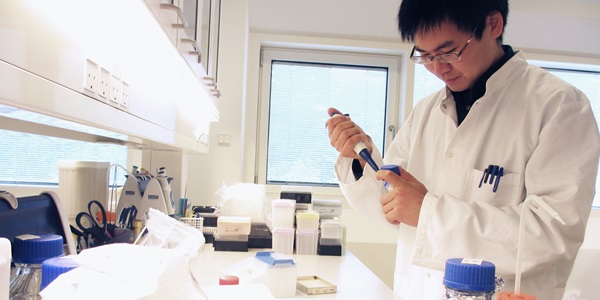A set of new molecular switches enable researchers to “push” bacteria to produce higher amounts of desired chemicals and proteins. The trick is to limit cell growth while maintaining the cells’ ability to produce chemicals.
How do you make an apple tree produce more apples? One option could be to alter the tree genetically, so that it uses its nutrients for making more apples instead of growing more branches and a thicker stem.
Using this approach, PhD Songyuan Li managed to make modified bacteria – so-called cell factories – produce larger amounts of specific bio-chemicals, i.e. chemicals produced by cells.
“We have developed a switch, which makes it possible to redirect the cell’s energy use from basic growth to making the desired chemical or protein,” says Songyuan Li, who recently defended his PhD thesis at The Novo Nordisk Foundation Center for Biosustainability, DTU Biosustain, at Technical University of Denmark.
The research has now been published in the journal Metabolic Engineering and the group has also filed a patent application on the system.

Songyuan Li in the lab.
Wanted to shift the metabolic balance
Today, the industry already uses bacterial cell factories to produce chemicals used in plastic goods, cosmetics, food ingredients, bio-fuels and precursors for making pharmaceutical drugs. But often the cell factories will produce very little chemical. This is a problem to the industry, co-author and Professor Alex Toftgaard Nielsen from DTU Biosustain explains:
“If the cells use a lot of the feed for basic metabolism, very little may be left for production of chemicals or proteins. Therefore, we developed this system, which shifts this balance, so that the nutrients are used efficiently for making the product, instead of ending up as commercially uninteresting biomass,” he says. The switch also has another benefit:
“In an industrial setting, the density of cells quickly gets very high in the fermentation tank. And it is very expensive and hard to aerate such a thick bacterial “mush” sufficiently. But with this switch, the cell growth slows down, which makes it easier and cheaper to aerate the microorganisms,” says Alex Toftgaard Nielsen.
Turn down the availability of sulfate
"With this switch, the cell growth slows down, which makes it easier and cheaper to aerate the microorganisms"
Professor Alex Toftgaard Nielsen
The group tested the switch on E. coli cells, which was designed to produce higher amounts of either mevalonate or tyrosine. Tyrosine is an amino acid, which can be used for the synthesis of anti-Parkinson drugs called L-DOPA or for making a range of antioxidants.
Mevalonate can be turned into terpenes and carotenoids, which can be converted to for instance anti-malarial medicine, rubber and even biofuels.
Thus, high intracellular production of these intermediate products is very sought for, since this can drive the next steps in the production of high-value chemicals and certain pharmaceuticals.
In one series of experiments, Songyuan Li grew E. coli with production pathways for either tyrosine or mevalonate under eight different conditions, each with a specific nutrient composition. The experiments showed that when the bacteria had limited access to sulfate, they produced 80% more mevalonate and 50% more tyrosine.
On the contrary, limiting other nutrients such as nitrogen resulted in a lower product yield. This indicates that sulfate depletion slows down cell growth and at the same time allows for continued production of chemicals, whereas a lack of nitrogen makes the cell direct its energy use towards basic metabolic reactions.
Conditional repression of growth relevant genes
Next, the group tried to repress some of the genes involved in cell replication to inhibit cell growth. This was done by making so-called conditional knock-downs using the CRISPR interference system – a modified version of the genetic scissors CRISPR. This conditional knockdown allowed the researchers to inhibit cell growth at an exact point in time.
Normally, when cells’ growth is being inhibited, they stop making enzymes and chemicals. But in this experiment, some of the repressions (knock-downs) resulted in more than 40 percent increase in mevalonate production and a two-fold increase in protein production compared to non-repressed strains.
“If your company is producing proteins, this switch can enhance the production as well, which again makes it cheaper to produce and refine proteins using cell factories,” Alex Toftgaard Nielsen says.
- Songyuan Li has been enrolled in a PhD programme called BacTory. This ambitious programme provided young scientists with scientific and industrial skills for the development of the future microbial-based factories.
- BacTory stands for Bacterial Cell Factories and is a PhD training programme (ITN) providing young scientists with a combination of scientific, industrial and entrepreneurial skills.
- The Novo Nordisk Foundation Center for Biosustainability (DTU Biosustain) was in charge of the PhD program, which was funded by the EU Marie Curie Program with 30 million Danish kroner.
- This 3-year program includes participation in course activities to expand the scientific skills and the awareness of business options.
- 14 PhDs with 9 different nationalities have been trained in the program, and 11 companies throughout Europe served as associate partners.
- The program started in 2013, and the students have now handed in their thesis.